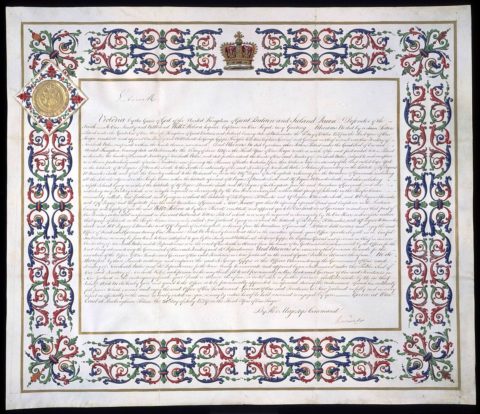The Statute of Monopolies (1624) is often said to have been critical in helping to start England on the road to the Industrial Revolution, but in the latest Age of Invention newsletter Anton Howes argues it is far more complicated than it seems:

Letters Patent Issued by Queen Victoria, 1839. On 15 June 1839 Captain William Hobson was officially appointed by Queen Victoria to be Lieutenant Governor General of New Zealand. Hobson (1792 – 1842) was thus the first Governor of New Zealand.
Constitutional Records group of Archives NZ via Wikimedia Commons.
One of the most frequently mentioned landmarks in the history of intellectual property is the Statute of Monopolies, passed by the English parliament in 1624. I’ve often seen it lauded as the beginning of the system of patents for invention, or the first patent law. I remember giving a talk a few years ago where I downplayed the role of formal institutions in encouraging the Industrial Revolution, prompting an outraged economist in the audience to point to the law as a sort of gotcha — “here’s a better explanation: with patents you incentivise invention, and the Brits had just invented patents”.
Which is all to illustrate that the Statute of Monopolies is often fundamentally misunderstood. So what, exactly, did it actually do? It’s a tale of opportunism, corruption, and court intrigue, with some actual innovation inbetween. The whole saga ended Francis Bacon’s political career, led to a major constitutional crisis, and set the scene for how inventors were to behave and act for well over a century. In this first part, I’ll give the context you’ll need to really appreciate what was going on, and I’ll publish the rest in the weeks to come.
First off, the Statute of Monopolies was certainly not the first patent law. Venice’s senate had enacted a law on monopolies for invention as early as 1474. But even then, we shouldn’t be looking for statutes at all. The history of patents does not begin in 1474, but much earlier, with plenty of monopolies over new inventions having already been granted by the ruling grand council of Venice, and by the authorities of other Italian cities like Florence. The key thing to recognise about early patents is that they were not a creation of parliaments or their statutes, but of those in charge. They were the creation of sovereigns, a creature of kings and queens (or in the case of republics like Venice, of governing councils).
As regular readers of this newsletter might remember, patent monopolies for invention had already had long history in England, well before 1624. Patents in general were a very ordinary tool of English monarchs, used to communicate their will. By issuing letters patent, monarchs essentially issued public orders, open for everyone to see. (Think “patently”, as in clearly or obvious, which comes from the same root.) Monarchs used letters patent to grant titles and lands, appoint or remove people as officials, extend royal protections to foreign immigrants, incorporate cities, guilds, even theatre troupes — in general, just to rule.
And, eventually, English monarchs copied the Venetians by issuing letters patent to grant temporary monopolies to particular people, to encourage them to make discoveries, publish books, or introduce new industries or inventions to the realm. It’s only over the passage of centuries that we’ve come to refer to patents for invention — a mere subset of letters patent, and really even a mere subset of patent monopolies for all sorts of other creative work — as simply patents. Intellectual property was thus a ruler-granted privilege, created in the same way that a town gains the official status of a city, or a commoner becomes a knight. English monarchs began granting monopolies for discovering new territories and trade routes from 1496, for printing certain books from 1512, and for introducing new industries or inventions from 1552 (with one weird isolated exception from as early as 1449).



